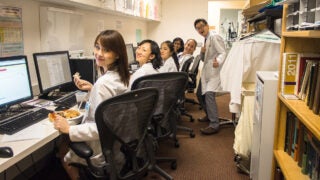
They combat the stress and anxiety of hundreds of Californians — from their own homes
As the new coronavirus spreads across the world, the telehealth clinic at the USC Suzanne Dworak-Peck School of Social Work sees increased demand for counseling related to stress and anxiety.
Fear of getting sick or losing a loved one to COVID-19. The stress of running online work meetings and taking care of wriggly children at the same time. Anxiety about paying the bills after being laid off.
As the new coronavirus sends coughing and feverish patients to hospitals worldwide, its less visible toll on mental health is also significant and serious.
Health officials worry it could exacerbate already growing rates of anxiety and depression in the U.S. population. For instance, a federal survey found episodes of major depressive disorder jumped from 8.8% in 2005 to 14.4% in 2018 among adolescents and from 8.8% to 13.8% in the same period among adults aged 18 to 25.
In response, professionally trained social work interns at USC are doing their part to provide reassurance and comfort to members of the community in need.
USC social work interns meet with more than 100 patients a week via telehealth
Master’s-level interns at the USC Suzanne Dworak-Peck School of Social Work have long offered therapy online to more than a hundred patients throughout California each week through the USC Telehealth clinic. The number of people seeking their support services has climbed in recent weeks due to the coronavirus pandemic.
“Some of them have shared that they are confined to their home,” said Lourdes Barajas, the clinic’s operations coordinator. “Others who call us are school administrators, like principals and vice principals, wanting to offer our services not only for their students, but for families, for parents. They mention they have parents who have lost their job. It’s a high-stress time for a lot of people.”
Every week, clinic interns counsel about 130 patients, under the guidance of USC faculty members who are licensed clinical social workers. They’re looking for additional counselors so they can help even more.
The school might have a ready resource: Because of office closures related to COVID-19, many other USC social work master’s students can’t travel to community social service agencies to complete their required field training right now.
They might be able to strengthen the ranks of interns already working in USC’s telehealth clinic, said Sarah Caliboso Soto, the clinic’s interim clinical director and clinical assistant professor of field education. “We don’t know how long this is going to last, and we’re all confined to our homes, so we definitely want to increase our capacity and our workforce so we can reach as many people in need as we can.”
Online mental health care’s popularity may rise even beyond the pandemic
She said 25 master’s-level interns currently meet with clients through video visits to talk through issues like anxiety, financial stress and family conflict. The clinic treats people with mild to moderate mental health problems, including grief, depression and posttraumatic stress. Spanish- and English-speaking therapists are available to help people throughout California aged 12 or older. Patients are referred for services through outside organizations that contract with the clinic.
Caliboso Soto believes online mental health care will become more popular, even after the COVID-19 pandemic. In part, that’s because it enables patients to get counseling without having to find a way to travel to the clinic.
“For our patients, they get to access services in the privacy of their home,” she said. “It increases accessibility for people who are homebound, for children, for older adults and people who are sick. What we’re doing now is helping people see these benefits.”



